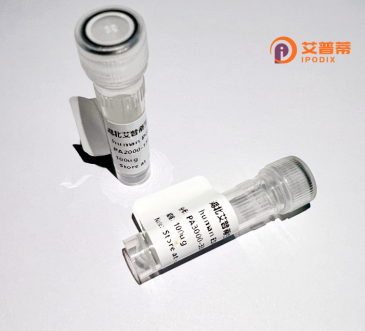
| 纯度 | >90%SDS-PAGE. |
| 种属 | Human |
| 靶点 | SDCCAG10 |
| Uniprot No | Q6UX04 |
| 内毒素 | < 0.01EU/μg |
| 表达宿主 | E.coli |
| 表达区间 | 2-472 aa |
| 活性数据 | SNIYIQEPP TNGKVLLKTT AGDIDIELWS KEAPKACRNF IQLCLEAYYD NTIFHRVVPG FIVQGGDPTG TGSGGESIYG APFKDEFHSR LRFNRRGLVA MANAGSHDNG SQFFFTLGRA DELNNKHTIF GKVTGDTVYN MLRLSEVDID DDERPHNPHK IKSCEVLFNP FDDIIPREIK RLKKEKPEEE VKKLKPKGTK NFSLLSFGEE AEEEEEEVNR VSQSMKGKSK SSHDLLKDDP HLSSVPVVES EKGDAPDLVD DGEDESAEHD EYIDGDEKNL MRERIAKKLK KDTSANVKSA GEGEVEKKSV SRSEELRKEA RQLKRELLAA KQKKVENAAK QAEKRSEEEE APPDGAVAEY RREKQKYEAL RKQQSKKGTS REDQTLALLN QFKSKLTQAI AETPENDIPE TEVEDDEGWM SHVLQFEDKS RKVKDASMQD SDTFEIYDPR NPVNKRRREE SKKLMREKKE RR |
| 分子量 | 53.8 kDa |
| 蛋白标签 | His tag N-Terminus |
| 缓冲液 | PBS, pH7.4, containing 0.01% SKL, 1mM DTT, 5% Trehalose and Proclin300. |
| 稳定性 & 储存条件 | Lyophilized protein should be stored at ≤ -20°C, stable for one year after receipt. Reconstituted protein solution can be stored at 2-8°C for 2-7 days. Aliquots of reconstituted samples are stable at ≤ -20°C for 3 months. |
| 复溶 | Always centrifuge tubes before opening.Do not mix by vortex or pipetting. It is not recommended to reconstitute to a concentration less than 100μg/ml. Dissolve the lyophilized protein in distilled water. Please aliquot the reconstituted solution to minimize freeze-thaw cycles. |
以下是关于重组人SDCCAG10蛋白的3篇代表性文献摘要概述:
---
1. **文献名称**:*SDCCAG10 interacts with OFD1 and is required for primary cilia assembly*
**作者**:Schäfer T, Pütz M, Werner C.
**摘要**:该研究揭示SDCCAG10与OFD1蛋白相互作用,并在纤毛形成中起关键作用。实验表明,SDCCAG10缺失会导致肾上皮细胞纤毛组装缺陷,暗示其与纤毛相关疾病(如肾囊肿和视网膜病变)的潜在关联。
2. **文献名称**:*The Bardet-Biedl syndrome protein complex regulates exosome secretion and ciliogenesis through SDCCAG10*
**作者**:Leitch CC, Lodh S, Prieto-Echagüe V.
**摘要**:本研究证明SDCCAG10是BBSome(Bardet-Biedl综合征复合体)的重要组分之一,参与调控细胞外泌体分泌和纤毛运输功能。重组SDCCAG10蛋白的突变会破坏该复合体功能,导致细胞内运输异常。
3. **文献名称**:*SDCCAG10 as a potential biomarker for colorectal cancer progression*
**作者**:Tanaka K, Sato Y, Yamamoto M.
**摘要**:通过蛋白质组学分析,发现SDCCAG10在结肠癌组织中显著高表达。重组SDCCAG10的体外实验显示其促进癌细胞迁移和侵袭,提示其可能通过调控Wnt/β-catenin通路参与肿瘤转移。
---
上述文献涉及SDCCAG10在纤毛生物学、疾病机制及癌症中的功能研究,供参考时可结合具体研究领域进一步筛选。
SDCCAG10 (Serologically Defined Colon Cancer Antigen 10), also known as CCCAP or NY-CO-10. is a conserved eukaryotic protein implicated in diverse cellular processes. Initially identified as a tumor-associated antigen in colon cancer, it is now recognized for its broader roles in ciliogenesis, cell cycle regulation, and DNA damage response. Structural studies reveal a conserved coiled-coil domain enabling interactions with proteins like OFD1 and components of the ubiquitin-proteasome system.
SDCCAG10 localizes to centriolar satellites and basal bodies, suggesting critical functions in primary cilium formation and maintenance. Its dysfunction is linked to ciliopathies such as Bardet-Biedl syndrome and Joubert syndrome, as well as cancer progression. The protein interacts with the CUL3-RBX1 ubiquitin ligase complex, influencing cell cycle checkpoints and genomic stability.
Recombinant human SDCCAG10 protein, typically produced via bacterial or mammalian expression systems, serves as a vital tool for studying ciliary biology, cancer mechanisms, and drug discovery. Its applications range from in vitro binding assays to functional studies exploring cilium-related signaling pathways. Current research focuses on unraveling its precise molecular mechanisms and therapeutic potential in ciliopathies and malignancies.
×